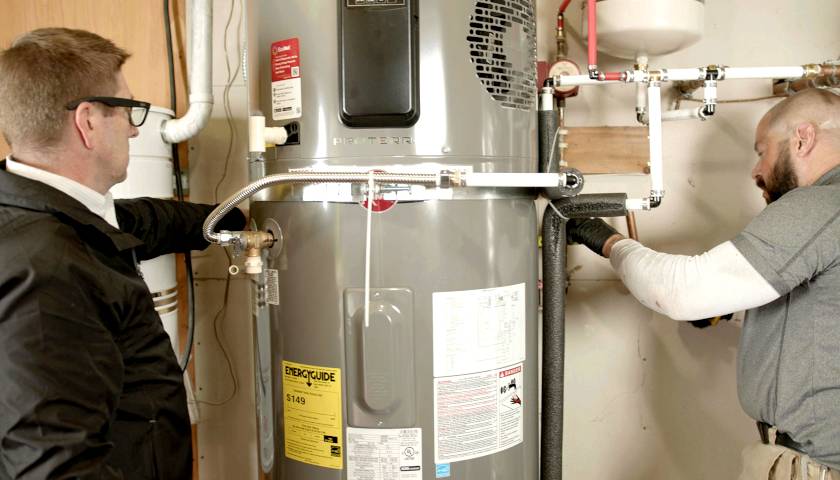by Kevin Killough
In April, the Biden administration finalized efficiency standards for residential water heaters, as part of a broader climate goal of electrifying the American household.
The Department of Energy estimates that, under the new rules, 50 percent of newly manufactured electric storage water heaters will utilize heat pump technology to be in compliance. The standards go into effect beginning in 2029.
The Biden administration claims its standards will save households $7.6 billion per year, and contractors who install heat pump water heaters (HPWH) told Just the News that these appliances do save money and operate with efficiency gains far above conventional appliances. But while they praise the technology, they’ve seen considerable problems with the units they’ve installed in the few past years.
Early adopters of electric vehicles were big fans of the technology, but the Biden administration rolled out mandates that aimed to get 66 percent of all cars on the road to be electric by 2032. The vehicles’ high purchase price, limited range, long charging times and limited charging stations have left nearly half the country shying away from purchasing the vehicles.
The Biden administration set out to address the charging issues with a plan to build stations across the country, but despite allocating $7.5 billion to build 500,000 stations by 2030 the administration has only managed in two-and-a-half years to build seven.
With the problems contractors have had with HPWHs, the administration’s appliance efficiency standards could become another mandate that imposes technologies upon consumers before those technologies are ready for widespread adoption.
‘Remarkable’ technology
Nate Adams is a home energy efficiency expert known as The House Whisperer.
“I help clients make their homes more comfortable and healthier,” he told Just the News. Adams said that the average American household will use about 5,000 kilowatt hours per year for a common resistance electric water heater. A HPWH will use between 500 and 1,000 kilowatt hours per year, he said.
“It’s a pretty remarkable piece of technology,” Adams said. However, he said, with the units he’s installed in the past couple of years, he’s seen considerable problems.
“The biggest thing seems to be a manufacturing defect where they tend to leak refrigerant,” Adams said. When the refrigeration fluid leaks, Adams said, there’s not really any way to repair it. So, the unit has to be discarded and replaced.
He’s also seen the compressors go out. He purchased a Rheem for his own house in Ohio, which he’s since sold, and that had a failed compressor. This also meant replacing the entire system. He had a compressor go out in an HPWH in one of his AirBnBs. A recent client of his had his HPWH fail after six months.
He said the units cost $1,300 to $2,000, and the installation is $5,000 to $10,000. Warranties sometimes cover the replacement costs, but not always the labor.
Adams is the admin for a Facebook group for fans of home electrification called “Electrify Everything,” and he said he’s seen many stories from members of the group with similar problems. The systems he installed more than a few years ago were much more reliable, he said. He’s not sure why, but in the past few years, they’ve begun failing regularly.
‘That’s weird’
Tim Portman, an HVAC contractor and owner of Ohio-based Portman Mech, told Just the News that he’s been installing and maintaining water heaters for 25 years. Recently, they started installing HPWHs, and he’s seen the same problems Adams has. He replaced the electric water heater in his office manager’s home with an HPWH from AO Smith, which failed within a year.
“We were like, ‘That’s weird,’” Portman said. They replaced the unit, and it happened again a year later. They chalked it up to problems with the manufacturer, so they replaced the broken AO Smith unit with a unit from Rheem, as the company had a good reputation.
“The Rheem failed in about a year’s time,” he said.
Portman also installed a Rheem unit in his own home. It failed, he said, within a year’s time, and then the replacement also failed. He said the last client he installed one for — a man who is a self-professed early adopter of heat-pump technology — got 14 months out of his unit before it failed.
He said the manufacturers won’t sell individual parts, and they’re tough to fix even when you have that option. In almost every case, the unit has to be discarded.
“It weighs 300-plus pounds, and in the Cleveland area they’re installed in basements. It’s an all-day process swapping these things out. It’s a bear for everybody involved,” Portman said.
As a result of the problems, Portman said he’s no longer advocating that people install them. “I don’t want to keep this revolving door of us having to warranty your water heater out every year or so, because you’re not going to get enough money to justify it,” Portman said. He said Portman Mech lost about $13,000 in warranty repairs.
Blowing up
Like Adams, Portman said the technology is not the problem. Portman said he’s reached out to Rheem a few times to say he’s seeing about 60 percent of the units he’s installed fail within a year, but the company wasn’t helpful.
“It’s a big corporation, and we’re basically just getting passed along,” Portman said. Just the News reached out to Rheem and AO Smith. AO Smith didn’t respond, and Rheem declined to comment.
Portman said they got into the business of installing the units fairly recently, but he has had clients who installed their HPWH years ago, and they don’t have these reliability issues. He said it’s a big disservice to the industry and the contractors who are encouraging people to install the units. While they save money over time, he said, there is a big up-front cost. Those savings are lost if the units have to be replaced every year.
“It’s blowing up in literally everyone’s face. It’s very frustrating,” Portman said.
Portman said he’s a supporter of electrification and doesn’t view these issues with HPWH’s as something inherent in the technology.
“I don’t say, like, all-electric is in everyone’s best interest just for the environmental side, but I think long-term costs, it’s going to be quite a bit less expensive to be able to heat and cool your home utilizing that,” Portman said.
He said he’s in discussions with another manufacturer who he hopes will be able to provide a quality product. “I foresee the problem as being a reliability issue. I think that … someone’s going to come around and make this right. I just hope the existing manufacturers correct it as well,” Portman said.
The Biden administration’s efficiency standards for water heaters go into effect in 2029, and then about half of all homes installing new water heaters will have to go with an HPWH. Hopefully, for most homeowners and installers, that’s enough time for these problems to be sorted out.
– – –
Kevin Killough is a reporter for Just the News.
Photo “Rheem Heat Pump Water Heater” by Rheem.





